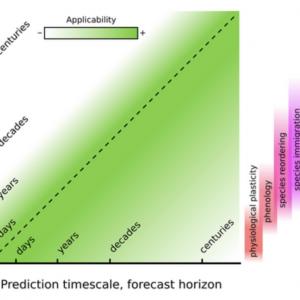Ecological Acclimation
Date
Ecosystems respond to climate change at radically different speeds, from immediate physiological shifts to centuries-long evolutionary changes, thus making it difficult to predict how they’ll evolve over time. A new study, including NC CASC co-lead ecologists, Kyra Clark-Wolf and Laura E. Dee, introduces “ecological acclimation” as a unifying framework to integrate fast and slow biological responses across species and systems. By focusing on how ecological sensitivities to climate shift over time, the framework helps clarify why some ecosystems may appear stable while others are in flux. Case studies from coral reefs, soil microbes, and plant communities show that assumptions about these acclimation processes, often hidden in models, can drastically alter climate impact forecasts. Making these time-scale dynamics explicit will better equip scientists and resource managers to plan for ecological futures from the next growing season to the next century.


